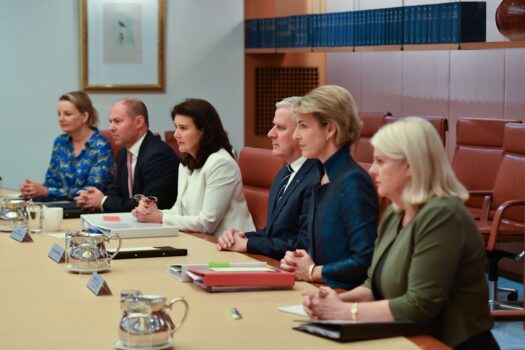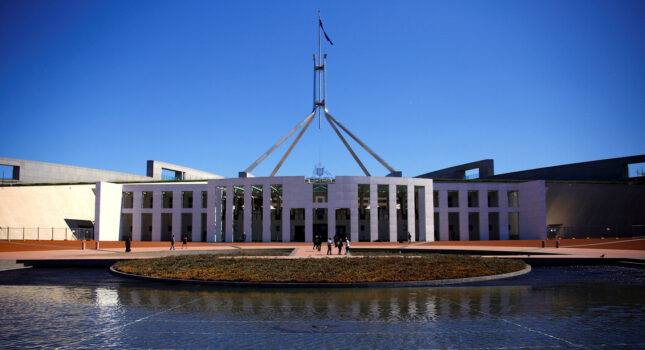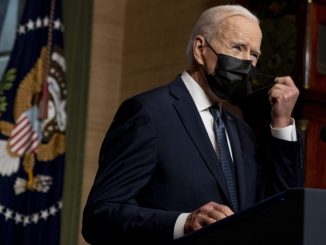
Commentary
Recently, the Australian federal government has been plagued with revelations of inappropriate sexual conduct by politicians and staffers in Parliament House.
The uproar started with explosive allegations that a former Liberal staffer Brittany Higgins, had been raped in March 2019 in the offices of then-Minister of Defence Linda Reynolds.
This terrible event resulted in an avalanche of other allegations, which exposed the sordid environment of sexual exploitation, intimidation, and depravity infesting Parliament House.
It all snowballed out of control, and new revelations of inappropriate sexual behaviour were levelled at predatory males. There were repeated calls for a change in the “toxic culture” of Parliament House.
To deal with these embarrassing revelations, Prime Minister Scott Morrison announced that he would be willing to consider the setting of gender quotas in the pre-selection of Liberal candidates.
Following the allegations of sexual misconduct, at least five female Liberal politicians publicly committed to supporting the setting of female quotas.
These include Foreign Affairs Minister Marise Payne, Karen Andrews, Sussan Ley, Melissa Price, and Katie Allen.
They argued that quotas were necessary to change the “toxic culture” of gender exploitation in Canberra. The setting of quotas was thus regarded as a convenient device to increase the representation of women in the Australian Parliament.

Currently, only 23 percent of the Liberal members of the House of Representatives and the Senate are female. This compares unfavourably to the 47 percent for the Australian Labor Party.
More moderate members of the Liberal Party have suggested that, instead of quotas, the Party should instead set targets.
In this context, I noted in my book “Affirmative Action: The New Discrimination (1985)” that the achievement of targets “does not amount to the attainment of mandatory quotas” because a target is only an “expectation that some measurable change will occur, thereby allowing flexible statistical results.”
However, even if it is a numerical aspiration, a target may still involve the pre-selection of less meritorious candidates than those who would typically have been selected.
This would happen if those supporting targets felt that the pursuit of equal opportunity must, in practice, lead to the equality of results. Further, it would also assume that skills and interests are uniformly distributed throughout society.
If this is so, then the setting of targets would result in the implementation of the principle of equality of results, not equality of opportunity. This, in practice, means targets may operate as a de-facto quota because a target does not have to be met, making it essentially meaningless.
Thus, the question that needs to be answered is not if a quota or a target would improve the gender balance of the Liberal Party. Instead, it is if this practice respects the principle of equality of opportunity. Or if it even leads to an equality of results.
Professor Augusto Zimmerman has argued in an opinion piece in The Epoch Times that former Prime Minister Robert Menzies, who founded the Liberal Party, would have been appalled by the setting of quotas or targets.
He would undoubtedly have regarded the views expressed by the current generation of Liberal politicians as trendy examples of “illiberal” behaviour because he favoured the pre-selection of candidates on the ground of personal merit.
Also, the expectation that the current culture of sexual exploitation and depravity, so rife in Parliament House, could be cured by the setting of quotas or targets is overly optimistic and unrealistic.
Cultural traditions cannot be changed overnight because they develop over centuries, even millennia, and are part of the heritage of a country.

Moreover, in setting quotas or targets, it would no longer be possible for the Liberal Party to claim that people are appointed purely on merit because the principle of equality of opportunity would be compromised.
It is interesting to note that the quota language, so flippantly promoted by some parliamentarians, would, in fact, involve the creation of a group of wronged, potentially angry men who may not have done anything to frustrate the opportunities of women.
Of course, proponents of the setting of quotas or targets would argue that this practice does not involve the pre-selection of “unqualified” women.
While this may well be true, the practice still fatally compromises the principle of equal opportunity because the most “meritorious” applicant might fail to gain pre-selection.
Admittedly, the concept of “merit” itself is nebulous.
However, we know logically; two human beings can’t be equally qualified because there is always room for differentiation. One candidate must necessarily be better or more suitably qualified than another.
This is because there are many human characteristics and qualities that cannot be readily assessed in an interview or examination but, nevertheless, provide ways for interviewers to differentiate applicants from each other.
In conclusion, it is appropriate to refer to a statement by Barry R. Gross who admonishes his readers about the danger of embracing the principle of equality of results, “This new ‘equality’ substitutes for the rule of law or principle which took many centuries to establish, a rule of men which is no more than a rule of privilege and influence so rightly despised by the founders of liberal democracy.”
Gabriël A Moens AM is an Emeritus Professor of Law at the University of Queensland. He served as Dean of Law and Pro Vice Chancellor at Murdoch University. He is the author of a novel on the origins of the COVID-19 virus, A Twisted Choice (Boolarong Press, 2020).
Views expressed in this article are the opinions of the author and do not necessarily reflect the views of The Epoch Times.





Be the first to comment